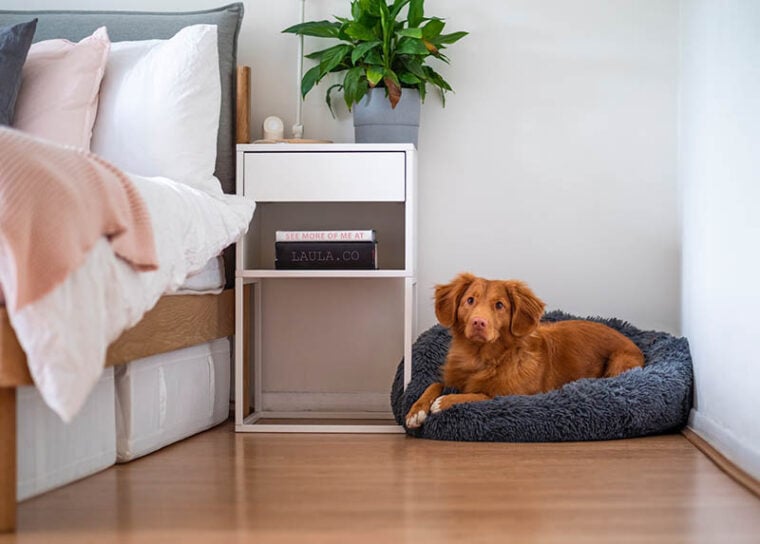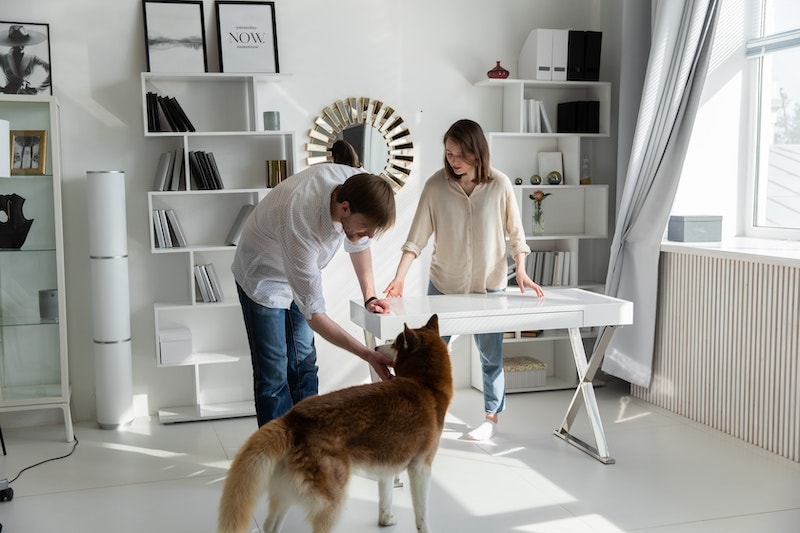
As if the thoughts of packing up and moving are not dreadful enough, the added stress of finding a rental that accepts pets makes the task overwhelming. There are so many things to consider. There are pet policies, fees, and restrictions that can make or break your decision on a potential rental.
So, if you are thinking about relocating with your pet, here are seven things you need to know about renting with your pet.

The 7 Things Every Pet Owner Should Know About Renting With Pets
1. Finding a Rental That Is Pet-Friendly
Although we have come so far when it comes to people and places being pet-friendly, finding a rental with your pet may not be as easy as you would think. Landlords may have strict policies for size, breed, number of pets, and so on. There are also many listings that have a “no pets policy.” No matter how perfect the apartment is, moving in with a pet that is restricted or a place where pets are not allowed is never a good idea.
We recommend taking the time to find a place that you love that will love your pet too. Otherwise, if you get caught having a pet that is not allowed, you can end up getting evicted.
To find a place that is pet-friendly, use filters on rental websites that list pet-friendly houses and apartments. That way, you will not be looking at places that are off-limits to pets.
2. Try Negotiating With the Landlord

If you stumble upon a rental that does not allow pets, talk to the landlord. You may get lucky and find a landlord that is lenient and willing to adjust the pet policy. Talk to the landlord about their concerns and reassure them that you are a responsible pet owner. Make it clear that you will not allow your pet to damage property.
It is also important to validate the owner’s concerns. Reassure them that your dog is clean and well-behaved so it will not be a nuisance to the neighbors.
3. Create a Dog Resume
Creating a dog resume gives you the opportunity to present your potential landlord with some insight into your pet. The resume should reflect any cute personality traits, completed or future training classes, and qualities that will portray your dog in a positive light.
In addition, show the property owner that you are a responsible pet owner by producing proof of shots and proper licensing. It is also a good idea to get references from previous landlords or neighbors that could put in a good word for you and your pet.
4. Meet and Greet

If your landlord is a bit apprehensive about renting to you with a pet, offer to bring the dog over for a “meet and greet.” Never bring your dog to a prospective rental without asking the landlord’s permission. Arranging a meeting that gives the landlord an opportunity to see your pet is clean, well-groomed, and mannerly may help to seal the deal.
5. Signing a Lease
You finally found a place you love and a property owner that will take your pet. Now you need to sign the lease. Before doing so, be sure to read the fine print before signing the new lease. Be sure to get the specifics in writing, in case you have an issue later. Ask the landlord these specific questions and get the answers in writing!
These questions need to be answered in writing to protect both you and the landlord. If the rules and guidelines are not acceptable, do not sign the lease and resume your search.
6. Pet Fees

In most instances, pet-friendly property owners are going to require an extra fee for a pet. The fees can vary significantly depending on the landlord or property. Many times, there is a pet deposit that is in addition to the typical security deposit. It covers the landlord if the dog does damage to the property while you are living there. Another fee that may be incurred for a pet-friendly rental is “pet rent.” Pet rent is an additional monthly fee per pet in the apartment.
Pet deposits can cost up to $500 per pet. Pet rent can range from $25 to $100 per month per pet.
On top of pet deposits and pet rent, the landlord may require a non-refundable fee for pet cleaning. It will not be refunded even if your pet was accident-free and did not do any damage to the property.
The laws regarding pet charges do vary by state, however. It is worth your time and effort to do your research and know your rights as a pet parent and renter. You may also get valuable information about your rights from your realtor.
If, after you signed your lease and moved into your new apartment, you decide you would like to adopt a shelter dog, or get a new kitten, have a discussion with your landlord. If they agree, your lease can be amended to reflect the changes. Once the changes are in writing, re-sign the new lease.
7. Be Respectful of Others
Now that you are unpacked and settled in, you will get to know the people around you. Some may be pet lovers, and some may not. To avoid problems with your neighbors, be sure your dog is not barking excessively and your cat is not running around in the middle of the night. As you may guess, pet lovers want to sleep too.
If you have a pet that is acting out or feeling anxious, use positive reinforcement to manage bad behaviors. You can also incorporate some treat puzzles and chew toys to entertain the pups. For cats that may need to be amused, make cardboard playhouses, or get a cat tree.

Conclusion
Yes, finding a pet-friendly apartment has its challenges. It can also put a dent in your budget. Impossible as it may seem, finding a home for you and your pet is not that difficult. There are many out there, but they have restrictions, pet policies, and fees that vary by the landlord. So, we recommend you read the fine print, negotiate if necessary, and know what is expected before you sign a lease. Happy house hunting!
Featured Image Credit: Jamie Street, Unsplash








